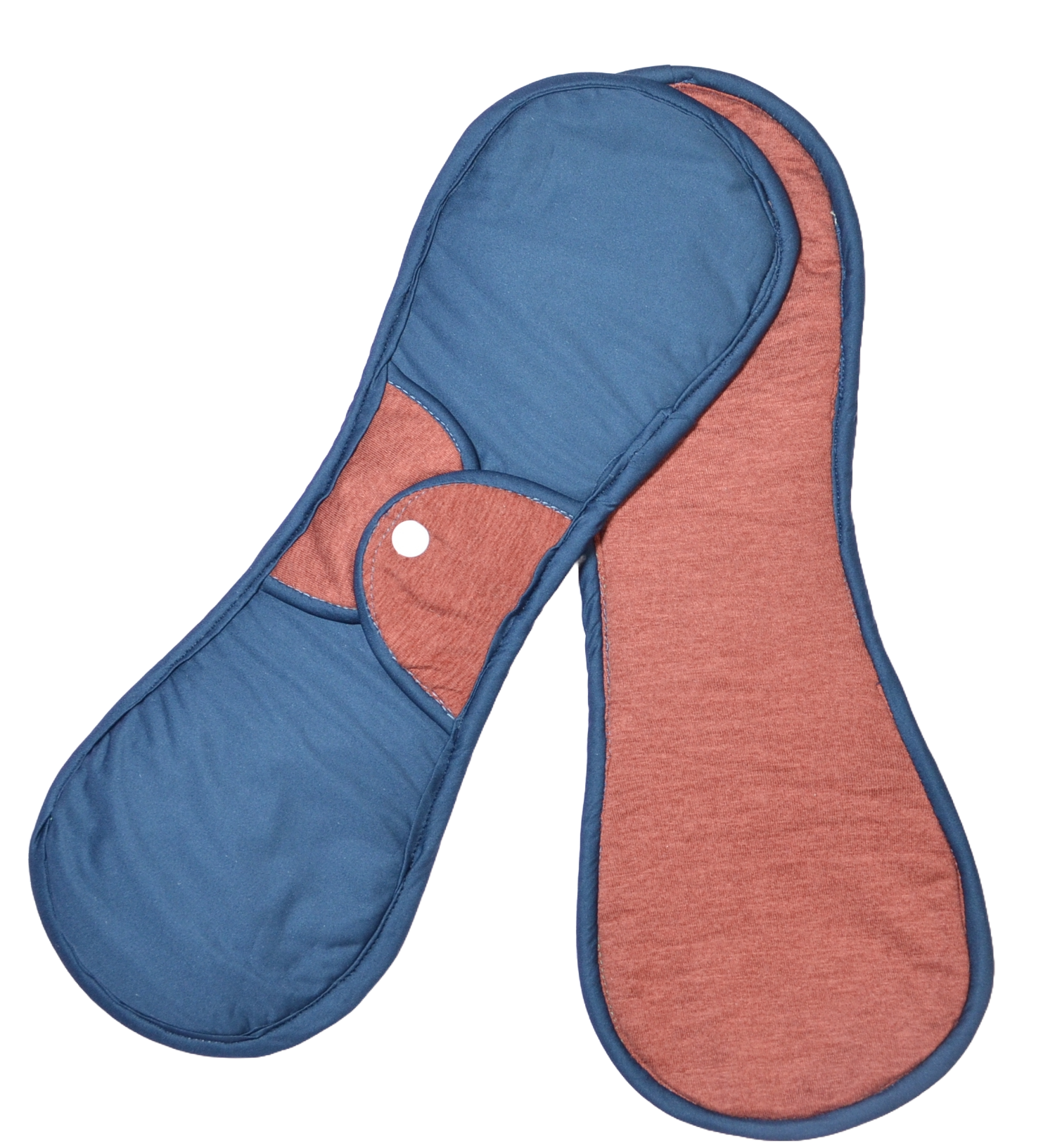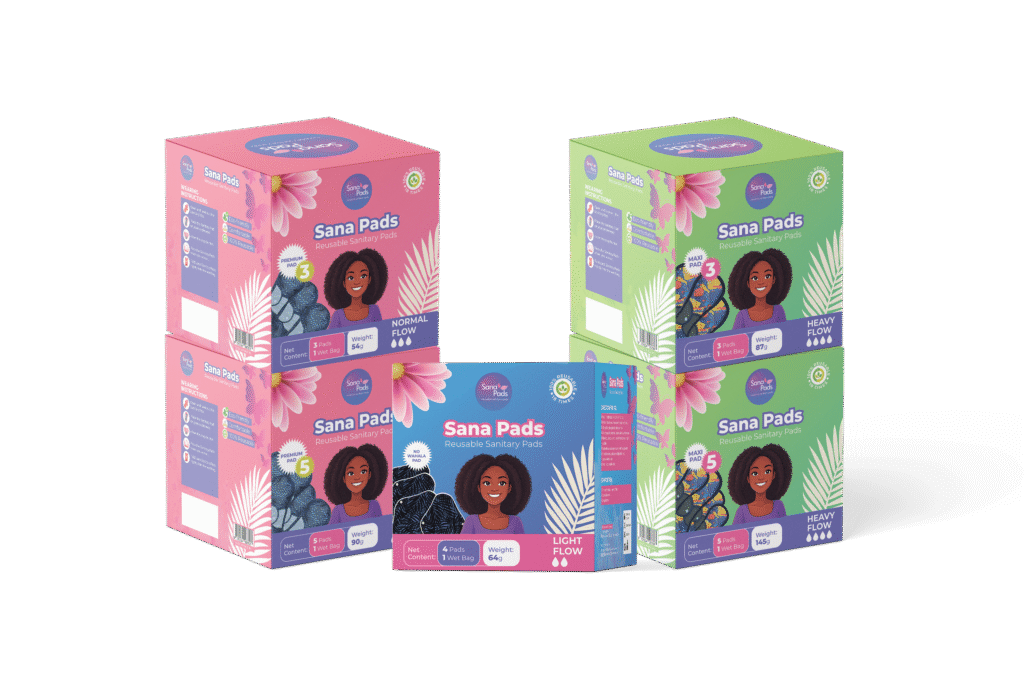How to Wash Reusable Sanitary Pads: A Complete Guide for Nigerian Women
When Amaka first switched to reusable pads during her NYSC year in Kaduna, her biggest worry wasn’t about comfort or leaks—it was about washing them. “Is it really hygienic to wash bloody pads?” she wondered, staring at her first Sana Pad. “What if they don’t get clean enough?”
If you’re reading this, you probably have similar questions. Maybe you’re tired of spending ₦2,000 every month on disposable pads, or perhaps you’re an NGO coordinator looking for sustainable solutions for the girls in your program. Either way, you’re wondering: how do you properly wash reusable sanitary pads?
Here’s the truth: washing reusable pads is easier than you think, and when done correctly, it’s completely hygienic. By the end of this guide, you’ll feel confident about caring for your pads, saving money, and protecting both your health and the environment.
Why Proper Washing Matters for Your Health and Wallet
Preventing Infections and Irritation
Proper washing isn’t just about cleanliness—it’s about your health. When you don’t rinse blood completely or store used pads incorrectly, bacteria can multiply. This can lead to urinary tract infections, skin irritation, or unpleasant odors.
The good news? Reusable pads like Sana Pads are actually more breathable than disposables, which means less moisture buildup and fewer infections when properly maintained. The key is removing all organic material through proper washing techniques.
Maximizing Your Investment
Think about this: one pack of Sana Pads costs about ₦3,000 – 5,000 but lasts 2-3 years. Compare that to spending ₦1,000 – 2,000 monthly on disposables—that’s up to ₦72,000 over three years! Proper care ensures you get every naira’s worth from your investment.
When you wash your pads correctly, they maintain their absorbency and leak-proof protection. Neglect them, and you might find yourself buying replacements much sooner than necessary.
What You'll Need Before You Start
Basic Supplies Every Nigerian Home Has
You don’t need fancy products to care for your reusable pads. Here’s what you probably already have:
- Cold water (from your well, borehole, or tap)
- Mild soap or detergent powder (avoid harsh chemicals)
- Clean basin or bucket for soaking
- Drying space (clothesline, drying rack, or clean surface)
Optional Items for Better Results
For stubborn stains or extra freshness, consider:
- Baking soda or salt for natural stain removal
- Dedicated wetbag for storing used pads when you’re away from home
- Mesh laundry bag to protect pads in the washing machine
What makes our pads unique?
1
Cost-Effective
Long-lasting durability means you save money over time.
2
3
Able to handle heavy flow prevent leaking.
Step-by-Step Washing Guide
Immediate Care After Use
The moment you remove your pad, rinse it under cold water. Yes, cold—this is crucial. Hot water will “cook” the proteins in blood, setting stains permanently into the fabric.
Hold your pad under the tap and gently squeeze until the water runs clear. Don’t scrub aggressively; just let the water do the work. If you’re at school or work and can’t rinse immediately, fold the pad and store it in a wetbag until you get home.
Pre-Wash Storage (Maximum 2-3 Days)
You have two storage options:
Dry Storage Method: After rinsing, store your pads in a breathable container or wetbag. Make sure air can circulate—never seal them in plastic bags. This method works well in Nigeria’s humid climate.
Soaking Method: Place rinsed pads in a bucket of cold water with a pinch of salt. Change the water daily, especially during hot weather. This prevents bacterial growth but requires more attention.
Warning: Never store unwashed pads for more than three days, especially during rainy season when humidity is high.
The Main Wash Process
Step 1: Pre-soak in Cold Water Fill a basin with cold water and let your pads soak for 2-4 hours or overnight. Add a tablespoon of salt to help break down any remaining blood.
Step 2: Choose Your Washing Method
- Hand washing: Gently rub the pads with mild soap, paying attention to stained areas
- Machine washing: Use a gentle cycle with cold water (maximum 40°C)
Step 3: Select the Right Detergent Powder detergent works better than liquid for blood stains. Avoid fabric softener completely—it coats the absorbent fibers and reduces your pad’s effectiveness over time.
Step 4: Rinse Thoroughly Whether hand or machine washing, ensure all soap is completely rinsed out. Soap residue can cause irritation and reduce absorbency.
Drying Your Pads Properly
Air drying is best for your pads and the environment. Hang them on a clothesline in direct sunlight when possible—the sun naturally bleaches stains and kills bacteria.
During rainy season, dry indoors with good ventilation. Use a fan if needed, but avoid placing pads directly on radiators or using a tumble dryer, as high heat can damage the waterproof layer.
Common Washing Mistakes Nigerian Women Make
Using Hot Water for Initial Rinse
Even if your generator heats water quickly, resist the temptation to use hot water for that first rinse. Hot water sets blood stains permanently, turning them brown and making them nearly impossible to remove.
Storing Wet Pads Too Long
In Nigeria’s humid climate, wet pads can develop mold or bacteria within 24-48 hours. Always rinse first, and if you must store wet pads, change the soaking water daily.
Over-Scrubbing or Using Harsh Soap
Aggressive scrubbing damages the absorbent layers and can cause pilling. Similarly, harsh soaps like bar soap or bleach can break down the waterproof backing. Gentle care gives better, longer-lasting results.
Our Reusable Sanitary Pads
Light Flow
Thinner and ligher pad designed for
the last days of your period.
Contains leakproof layer at the back.

Normal Flow


Tackling Stubborn Stains the Nigerian Way
Natural Stain Removers You Already Have
Salt Water Solution: Mix two tablespoons of salt in a liter of cold water. Soak stained pads for several hours before washing.
Baking Soda Paste: Mix baking soda with a little water to form a paste. Rub gently on stains and let sit for 30 minutes before washing.
Lemon Juice: For tough stains, apply fresh lemon juice and let the pad sit in sunlight for an hour before washing. The citric acid naturally bleaches stains.
When Stains Won't Budge
Don’t panic if your pads have light staining after proper washing—this is completely normal and doesn’t affect hygiene or performance. The staining is just iron from your blood, similar to how a white shirt might stain if you have a nosebleed.
If stains bother you, consider choosing darker-colored pads next time. Sana Pads offers various colors that hide staining while providing the same excellent protection.
Special Situations and Pro Tips
Washing During Heavy Flow Days
Heavy flow days require more frequent pad changes and rinses. Don’t let heavily soiled pads sit—rinse them immediately and wash within 24 hours. Consider using Sana Pads Maxi for heavy days, as they have extra absorbent layers that handle more flow while being just as easy to clean.
Managing Washing Without Running Water
If you fetch water from a well or have limited water access, fill a large container for pad washing. Use the least amount of water possible for rinsing, then do a thorough wash with soap. The soaking method works well here—just ensure you change the water regularly.
Teaching Your Daughter to Wash Her Pads
Start by washing pads together, showing her the gentle techniques. Explain why cold water works better and let her practice the rinsing technique. Building this confidence early helps her feel empowered about managing her period independently.
Time to get involved
Troubleshooting Common Problems
"My Pads Smell Even After Washing"
This usually means incomplete rinsing or bacterial buildup. Try soaking in salt water for several hours, then rewash with extra rinse cycles. If the smell persists, your pads may need a “strip wash”—soak overnight in hot water with baking soda, then wash normally.
"My Pads Feel Stiff After Washing"
Hard water can leave mineral deposits that make fabric stiff. Add a cup of white vinegar to your rinse water to soften naturally. Also, ensure you’re using the right amount of detergent—too much leaves residue.
"My Pads Are Losing Absorbency"
This often happens when detergent or fabric softener builds up on the fibers. Do a strip wash by soaking pads in hot water with baking soda overnight, then washing without detergent. Rinse thoroughly until the water runs clear.
The Sana Pads Advantage
Built for Nigerian Conditions
Sana Pads are designed specifically for our climate and washing conditions. Our high-quality bamboo fibers rinse clean easily, while the waterproof backing withstands frequent washing without deteriorating. We test every pad to ensure it maintains its effectiveness even after hundreds of wash cycles.
Our Washing Success Stories
“I was worried about washing pads properly, but following Sana’s care instructions made it so simple,” says Margaret from Abuja. “My pads still look good after two years, and I haven’t had any hygiene issues. Plus, I’ve saved so much money!”
Whether you’re buying for yourself, your daughter, or your organization, Sana Pads are designed to make the washing process as straightforward as possible
FAQ
Answers to common questions about reusable pads and menstrual care.
Sana Pads are made from high-quality, reusable materials, offering a sustainable and eco-friendly alternative to disposable sanitary products. They are gentle on your skin, highly absorbent, and cost-effective in the long run. By choosing Sana Pads, you contribute to reducing plastic waste while enjoying comfort and reliability throughout your cycle.
Sana Pads are designed for all-day use, providing comfort and protection for up to 8-12 hours depending on your flow. After each use, simply rinse them in cold water and machine wash them as needed. With proper care, our pads can last for several years, offering great value over time.
Yes, Sana Pads are made from soft, breathable, and hypoallergenic materials, ensuring they are gentle on your skin. They are free from harmful chemicals and toxins commonly found in disposable pads, making them an ideal choice for individuals with sensitive skin or allergies.
To clean your Sana Pads, rinse them in cold water after use to remove any residue, then machine wash with mild detergent. We recommend air-drying them, but they can also be tumble dried on low heat for quicker drying. With proper care, your Sana Pads will remain durable and effective for years.
Yes, we offer discounts for recurring wholesale buyers and customers who purchase 50 packs or more at once. The discount amount varies depending on the size of the order, and interested buyers can request the discount by sending us a direct message. We’re happy to assist and provide the best pricing for large orders.
Ready to Make the Switch?
Washing reusable sanitary pads isn’t complicated—it just requires the right techniques. Remember the key points: cold water for rinsing, gentle washing with powder detergent, proper storage, and air drying. With proper care, your Sana Pads will serve you reliably for years.
You’ve got this! Every woman who’s made the switch to reusable pads started with the same questions you have now. The difference is, you now have the knowledge to care for your pads properly from day one.
Ready to start your reusable pad journey? Check out our Starter Kit for everything you need to begin, or explore our Full Protection Kit for complete cycle coverage. For NGOs and bulk orders, contact our team to discuss how we can support your programs.
Have more questions about pad care? Visit our Knowledge page for additional tips and guides, or learn more about our mission to end period poverty sustainably.
When we choose reusable pads, we choose:
- Economic empowerment: Families save money that can be invested in education, business, and other priorities
- Health dignity: Chemical-free, comfortable protection that doesn’t compromise well-being
- Environmental responsibility: Reducing waste and supporting sustainable practices
- Educational opportunity: Ensuring girls stay in school and reach their full potential
For wholesale buyers and distributors, partnering with quality reusable pad manufacturers like Sana Pads means supporting proven solutions that create lasting impact in Nigerian communities.
The girls and women in your community deserve period products that protect their health, support their dreams, and respect their dignity. Reusable pads deliver on all three.
Ready to make a difference? Whether you’re considering reusable pads for yourself, your family, or your community program, the first step is getting accurate information and quality products.
Contact Sana Pads today to learn about our wholesale discounts and discover how reusable pads can transform your community’s approach to menstrual health. Because every Nigerian woman deserves period dignity that lasts.
Together, we’re not just changing periods—we’re changing lives.https://sanapads.com/contact-us/

Author: Margaret Ochegbudu

